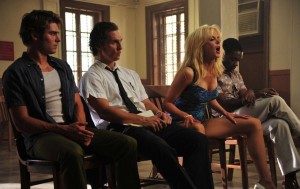Kidman, Efron, and onanism
I was not a fan of the Academy Award-winning Precious, because it took Murphy’s Law to beyond what seemed possible: Precious’ suffering was never-ending, always worsening, and virtually meaningless. Director Lee Daniels never flinched from showing us the worst of the worst of the everyday physical and emotional violence suffered by the obese, abused, HIV+ teenage Precious. More so than any film I have ever seen, Precious felt like poverty pornography.
That said, the skill of filmmaking could not be denied. Daniels can make beauty out of both mundane and grotesque images, and he can elicit the most surprising, the most entrancing performances, from Gabrielle Sibide and Monique in Precious to Nicole Kidman and Zac Efron in his follow-up, The Paperboy, a very different movie that is just as relentlessly visceral. It’s a deeply flawed movie, perverse in many ways and retrograde in others, but through most of it, I was still rather entertained. Continue…




